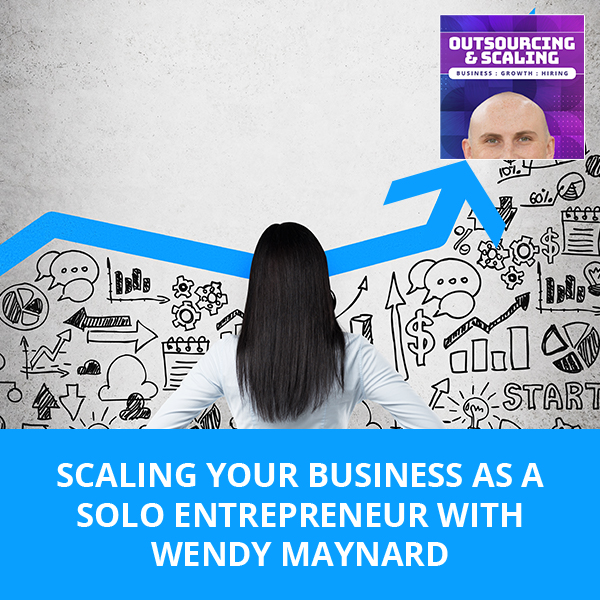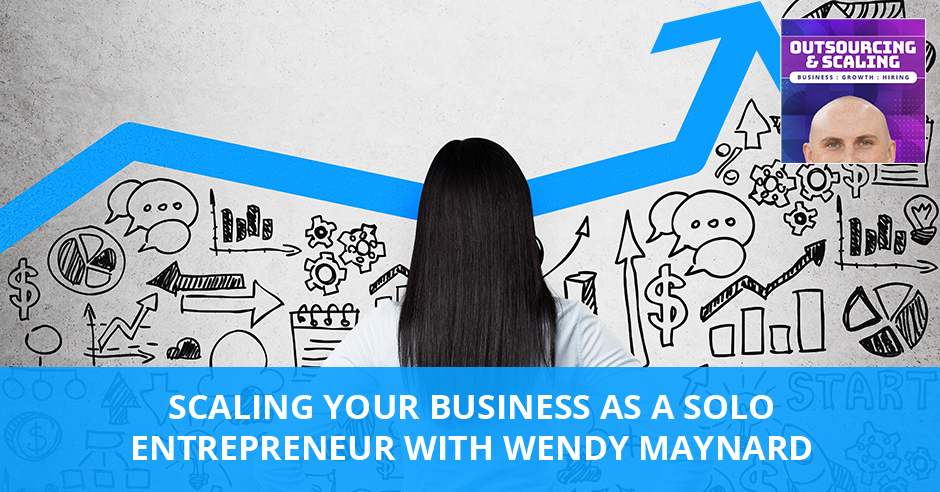


Having your business between that $2 and $30-million mark is one of the most exciting times for a lot of entrepreneurs. In this episode, Wendy Maynard talks about how you can scale your business as a solopreneur. As a marketing strategist and business consultant, Wendy helps clients get more leads, increase revenue, and grow profits. From someone who was just playing around, Wendy got hit by the entrepreneurial bug and ultimately went for the consulting gig. She shares her insights on the mistakes businesses make when trying to scale, as well as identifying higher-level tasks to focus on and hiring the right people.
—
Listen to the podcast here:
[smart_track_player url=”https://www.podetize.com/statsapi/www.podetize.com/wp-content/uploads/fileuploads/11-5b145ef137b51b3d1af0633e9305c43d/09/2019/7257d724f0ed3b21bc5b8d468eb9cb55.mp3″ title=”Scaling Your Business As A Solo Entrepreneur with Wendy Maynard” artist=”Nathan Hirsch” image=”https://freeup.net/wp-content/uploads/2019/04/OAS.png” ]
Download the audio file here.
Scaling Your Business As A Solo Entrepreneur with Wendy Maynard
I’m here with Wendy Maynard. Wendy, how are you doing?
I’m great. Thank you so much for having me on, Nathan.
Wendy is a marketing strategist and business consultant who helps her clients get more leads, increase revenue and grow profits. We were talking before that she focuses on businesses between the $2 million and $30 million mark, which is an exciting time for a lot of the entrepreneurs reading. Wendy, we’re going to talk all about that, but first, let’s take a gigantic step back. Talk to me about what you were like growing up. Did you always think you wanted to be an entrepreneur? Were you a straight-A student? Were you a rebel? I’m always curious where people come from.
I was probably a little bit of all of those things. I’m definitely a rebel. When I think about in high school, I suppose I fell into the popular crowd, but I hung out with everyone. If you’re human, I’m interested in talking with you. I got myself into a lot of trouble. I have always liked to do my own thing and so I never made a good employee other than waiting tables. I probably have worked for someone else for a total of ten months out of my entire adult life. I just am not built for having a boss. I need to be the boss. I have some funny entrepreneurial stories, but when I was first trying to do things, I had a lot of ridiculous businesses in my early days.
Let’s hear one of them. I’ve got to hear one good story.
One of my first ones was I decided that I was going to become a crafter. The thing that you have to understand is I never did crafts. For some reason, I got it in my head and I decided I was going to make dried flower wreaths and sell them at the local growers market. Needless to say, that didn’t last long. I ended up with a giant mess in a side bedroom of leaves and dried flowers and it took me probably months to get that cleaned up and I made very little money. I kept trying different things, throwing spaghetti at the wall and seeing what sticks and that one did not stick.
The fastest way to scale is having one core offer.
You mentioned you’ve been in the consulting business for twenty years when we were talking before. Bridge the gap a little bit. You went from someone who is playing around with being an entrepreneur. You knew you wanted to work for yourself. What happened that made you want to go into the consulting gig?
I have an undergraduate degree in public relations and marketing. I was addicted to Ultimate Frisbee. I waited tables to support my Ultimate Frisbee addiction and then traveled around doing that. At some point, I moved from the East Coast out to Oregon and that was when I was trying a lot of different entrepreneurial adventures. I ended up going back to school to get my Master’s in Environmental Studies. I thought I was going to get a job doing communications at an environmental nonprofit and the dot-com crash happened. That’s 1999. I fell into an adventure with a couple of other people and we decided by some crazy whim to start a marketing and design firm. The third partner, we ended up divorcing from her after the first couple of years and the rest is history. We grew it from zero to a multimillion-dollar firm. I co-own that for almost eighteen years and sold that a couple of years ago.
You work with a lot of businesses, big and small. I also see you’re active in your Facebook group, The Business Profit Engine. What is that number one mistake that you see businesses make as they’re trying to scale?
I see the number one mistake that people used is they try to do everything themselves and they spend a lot of their time on things that are not the highest and best use. One of the most important things to do when you’re growing and scaling is to focus on the foundational pieces that you can grow and scale. They don’t hire someone early enough. One of the first things that I did when I first started my consulting business on my own was to hire a virtual assistant. I hired a team quickly thereafter. People who are first starting off and think that they can’t afford it, my answer is “You can’t afford not to,” because you need to be the one who’s making the larger income. If you’re spending your time futzing around with trying to figure out a funnel and that’s not what your core area of expertise is, then you shouldn’t be doing it, so outsource it.
Let’s talk about higher-level tasks. What are those higher-level tasks that the business owners should be focused on?
In the very beginning it’s developing your core area of client service delivery. What are you selling? I work primarily with service-based businesses. What are you selling? Whether it’s consulting, coaching, analytics, accounting, it doesn’t matter, but know how you’re going to deliver that. Have a methodology and get clear on that. I find the fastest way to scale is having one core offer. I like premium pricing a lot. Besides that, have some recurring revenue model that can look a lot of different ways. Having those two things in place will allow you to scale pretty quickly. Your number one task besides that, when you’re trying to get to the first six or seven figures, is sales and marketing.

You talked about hiring for different tasks, things that are outside your core competency. What are your hiring tips? What do you look for when you’re hiring or when you’re consulting your clients to start hiring?
One of the things I always say is to go for the higher priced person first. This is always very surprising for someone who’s just starting out. Unfortunately, when you hire someone who’s at a lower price, what you sacrifice in opportunity costs often isn’t worth it. You’re paying less, but you often have to invest a ton of time in training that person. Whereas if you invest in someone who already knows what they’re doing, they can bring experience to you and they don’t need a lot of management. You can focus on things that are the highest best use of your time, which is money-making activities in your business.
What were some of the first lessons that you learned or that you see your clients learned when they’re hiring someone for the first time?
Hiring the wrong fit person is incredibly expensive both in time spent training, the effect on other team members and also in emotional cost to you as the CEO or business owner. It pays to get super clear on who you’re hiring from the get-go. Know not only the skillset that you want but the personality fit because you want them to fit into your culture. Even if your culture is only one person, make sure that their personality is a good fit with you. That can either be they’re very much like you or their skills are very much a complement of their personalities. For me, I’m a big-picture thinker so I know that I need a detail-oriented person who’s not scared to tell me, “You need to have this thing in place, Wendy, because you’re missing it.” I’m like, “Great. You’re a detailed person. I totally respect your area of expertise and that’s exactly why you’re hired.” Know thyself and then know what you want in place. Do not compromise on what you’re looking for. Hire someone who’s a great fit for exactly what you’re looking for.
What about as you get bigger, as you get over that $2 million, $5 million mark? How does your hiring strategy change? How does the structure of your business change?
I’ve helped a lot of people with their hiring process. When I’m working with clients on that level, the first thing that I always teach them is that you need to shift your thinking around HR and marketing as being siloed. Those two need to be in bed together and you need to start treating talent attraction and retention as a marketing function. That’s about building relationships and getting super clear on how you are attracting top talent. In a company, even when we’re talking about $2 million to $10 million, it’s still a fairly small size. Each hire is going to impact everyone else there. Hire slowly, fire fast because there are plenty of studies that show a bad apple truly can spoil the bunch.
The bigger you get, the more important that your culture gets.
It’s been shown through studies that one underperformer, one person who brings in drama and dysfunction can drag down an entire team of A-players. It’s detrimental. You still want to have an informed and calculated hiring process that takes the person along a trajectory slowly, hire them. The next step is having a well thought out onboarding process so that you inculcate them into your culture quickly. I have a whole bunch of other concepts around driving your culture by your mission and values, but too few people live and breathe them. They pay lip service to them, but they don’t weave them into their culture.
I’m assuming that culture becomes even more important as you get bigger, as you’re relaying that message to more and more people as opposed to just maybe that one virtual assistant that you’re talking to every day.
The bigger you get, the more important that your culture gets. One of the things I also tell people, particularly when we’re talking about someone who’s sub-30, under 200 or 100 contractors, is that most of the businesses are not going to be able to offer the same type of salary. If we’re talking about a boutique accounting firm, for example, they’re not going to be able to compete with the dollars that one of the big five or big three accounting firms can do. What do they have to offer? It’s not the top pay. It’s not probably the top benefit. It’s their culture and the opportunities that they provide to the team member that they bring on. They have to lead with that as a key selling and marketing opportunity. Why will that person want to not go with one of those big five, big three accounting firms, but come into their boutique accounting firm? It’s about the culture and the opportunities that they’re providing.
I love that you said that. I feel like a lot of entrepreneurs don’t realize that. If you can’t pay the top dollar, the more you focus on everything else, the less you have to pay to get that ideal person that you want. Not that you should low-ball people, but it makes it easier for you to attain that talent without paying top dollar if you have those other things intact. Who wants to go to someone with a bad salary and a bad culture and all the other stuff around it that doesn’t fit in line? I think that was a great point. Let’s pivot a little bit. Let’s talk about lead generation. I know that’s your thing. I see you’re talking about that on social media. There are many avenues to find new clients where there are different social media channels, email and marketing. How do you go about getting someone a real solid lead generation process?
It’s going to depend on where they are in terms of the maturity of their business. I’ll start with a mistake that I see a lot of times and then I’ll tell you what I advise clients do to correct it. One of the first things that I see in bigger companies is a lot of times they see it as an ad hoc activity or putting out fires activity. They’re not treating it strategically. The first thing is where are your best clients hanging out online? It could be offline, but if you’re using online strategies, where are they hanging out and how can you jump into that place? This applies to everyone. Hang out there a lot. Be consistent and persistent. What I see too often, the bigger companies will do that putting out fire or the ad hoc approach. Smaller, more startup companies will jump around like a kitten chasing butterflies in the garden like, “There’s a butterfly.” You’re not going to get any results if you do a little bit of Facebook, a little bit of blogging, a little bit of emailing and a little bit of Instagramming. That’s not going to get you the results. You need to choose where your potential clients are hanging out. Be consistent and persistent and own a platform. Set it up as a system, operationalize that into your business and then layer on the next thing.
What about building a lead generation or a marketing team? How do you start to build that infrastructure so you’re not just doing it yourself as a sole entrepreneur?

What I see a lot of entrepreneurs wanting to do because they don’t like sales is they’ll try to hire a salesperson. I’ve worked with people at all different-sized businesses. Hiring a great salesperson is hard. I’ve seen a lot more failures than I have seen successes unfortunately. A lot of times people have to go through multiple salespeople before they find the right fit. The key is to become masterful at your sales and marketing process before you start to outsource it. I feel strongly about that. I’m sure other people have different opinions. If you’re not masterful at your own processes, if you don’t understand who your people are, what attracts them, how do you convert them, it becomes challenging to train someone else, even if it’s someone who’s very good at sales. There’s that cultural piece, that personality fit. You need to understand what works for your business and then layer into it.
What I like to suggest is that people bring someone in who can support them in their efforts. For example, for me and my business, it’s me and my contracted team. I’m leading what’s happening. For example, I now have a person who’s writing my blog posts. Is it because I can’t do it? No, I can do my own blog posts. It’s just not the highest and best use of my time. We’ve worked together very carefully to craft a strategy, to craft editorial calendar, to capture my voice and personality. I review her stuff and edit it very heavily at first. Now she’s at a place where I just look at her stuff and she nailed it. That’s an example. You’re the CEO and you have to lead your sales and marketing efforts. If you don’t have enough clients, then you’re the person that needs to step in and lead that charge and then you can layer other people into that once you’d become masterful.
How does someone that’s not good at sales become good at sales? You hinted that it is an area you need to focus on. What are the steps to do that?
Unfortunately, there’s a lot of trial and error. One of the things that I like to recommend is that people start by setting up a system and a process for themselves. They need to do field research, which is getting on the phone with a lot of people and failing a lot. People don’t like to hear that because people have resistance to sales. Unfortunately, unless you get out there and talking to people, you’re not going to know what people need. You’re not going to know where your stumbles are. You’re not going to know how to create amazing services because you’re not feeling people’s pain unless you get out in the field and do field research. This is me being kind about having low converting sales calls, but it is true. People will sit back in their office and try to perfect a course or a service.
I was listening to someone talk about life coaches who are sitting and doing self-coaching. I’m like, “What’s that going to do?” Because you don’t have a business if you’re not getting out there and having sales calls. You need to get on the phone. You need to be networking. You need to be trying to get referrals. You need to fail a lot in order to get to success. There are certainly some people who come from a corporate environment where they were doing a lot of sales and they can have high conversion rates. I don’t have a better answer and it’s something that a lot of people don’t like to hear. If they’re not masterful now, they need to do what it takes to get to know their people and their target audience. The more they talk to people, the better that they will get at providing a solution. Their conversions will start to go from maybe 5% to 10% to then 10% to 20%. Eventually, the owner of a company should be able to get on a phone call and close 70% of their people.
You’ve got to figure out the sales process. It’s tough to teach. Everyone’s in a different industry, but if you can’t figure that out, it’s almost impossible to build a sales team around something that you haven’t figured out for yourself. Let’s talk about the bigger businesses that you work with, the $30 million. What are some other mistakes or situations that you see that we haven’t already talked about?
You’re not feeling people’s pain unless you get out in the field and do field research.
One of the biggest mistakes that I see, and I’m going to talk specifically around marketing and then take it into client service delivery because this is an arena that I think is a problem. A lot of bigger businesses have what I call a leaky bucket. They’re not focused on customer lifetime value and so they’re losing customers. This is true for smaller businesses too, but too often we focus on lead acquisition and it’s seductive. It feels fulfilling to our business and our team when we get on a new client. We’re totally focused on getting them all set up and getting them their initial, whatever it is, service delivery. However, that initial time with them is not particularly profitable. We focus on that again and again.
We don’t focus on client retention and we lose a tremendous amount of opportunity in terms of selling to them again and again, putting them on some recurring revenue program, selling them into something else that we offer. Your clients become more and more profitable. The longer that they’re with your company, they’re easier to sell to again and again. I see a lot of people falling short on focusing on client onboarding, client service delivery in terms of treating that person like a VIP. Upselling them again and again into more programs, more services, whatever it is that you offer and getting them onto some recurring revenue type of situation in your business. This is true across the board. If you have a leaky bucket and you are not focused on some subscription-based recurring revenue model, you are losing a ton of potential revenue and profit in your company.
Any other tips for bigger businesses or any other mistakes that you see?
I mentioned the idea of not treating, hiring and retaining talent. I’m going to give another one. This is around talent because I see this as a huge pain point. Especially right now, we have low unemployment rates. The top talent, the A-players who you want on your team, they are not sitting around and waiting for work. They’re hired and they’re pretty darn happy in their company where they are right now. The people that you want are employed. What that means is that you have to build your bench. People have to look at hiring and getting their talent as a process of building your bench. What I often counsel the CEOs that I work with is you’ve got to get people in your team, not only to build a great culture, but you need to start having conversations with people who you’re eyeballing.
I’m not going to say you’re going to poach them, but you should be having lunches with them. Talk to them like, “When you’re ready, we’d love to have you on our team. If you’re ever thinking about a transition, we have a great culture and here are some of the opportunities.” Start having regular conversations with those people who you think would make an amazing player because the truth is they’re employed and they’re happy. You’ve got to look forward in your business and start looking at those A-players, those amazing unicorns that you want in your company. The more A-players that you can get in your company, the more revenue that you will generate and the more profit you will get in your business.
Wendy, this has been great. Where can people find out more about you and what are you most excited about?
You can find out more about me at WendyMaynard.com. Also, if you want to join my Facebook group, I have a redirect, just go to BusinessProfitEngine.com and it will redirect you and hit join for the group. I think I’m excited about the things that I’ve always been excited about, which is helping entrepreneurs to succeed. It’s something I’m passionate about. I truly believe that entrepreneurs can change the world. They can provide great workplaces for their people. They can provide amazing experiences for their clients, whether it’s businesses or people, depending on where your focus is. The more that you work, you meaning every single one of us, the more that you work to be remarkable, remarkable workplace, remarkable at client delivery, we can all make this world a little bit of a better place.
Thanks so much and I’m sure we’ll be in touch soon.
It’s my pleasure. Thank you so much.
Important Links:
About Wendy Maynard
 Wendy Maynard is a marketing strategist and business consultant who helps her clients get more leads, increase revenue, and grow profits.
Wendy Maynard is a marketing strategist and business consultant who helps her clients get more leads, increase revenue, and grow profits.
